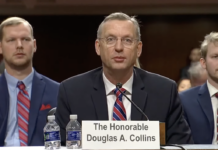
The state urged a federal judge to let Georgia’s strict abortion ban take effect, citing that abortion rights advocates have no case after the Supreme Court overturned Roe v. Wade.
Georgia’s 2019 law that bans most abortions when fetal cardiac activity is detected — usually around six weeks of pregnancy — has been held up in court for more than three years. A lower court judge initially blocked the law from taking effect, which was then appealed by the state.
Judges heard oral arguments in September but were wary to push the case forward as the Supreme Court was set to take up Dobbs v. Jackson Women’s Health Organization, a case from Mississippi that bans most abortions after 15 weeks.
But after the country’s highest court dissolved nearly 50 years of abortion protections in June, a federal appeals court ordered parties had 21 days to file briefs on the impact of the ruling.
With the deadline passed last week, a final ruling on the law could come any day.
MORE If Georgia’s strict anti-abortion law takes effect, uneven prosecutions could follow
The plaintiffs — made up of the ACLU of Georgia and a coalition of abortion rights advocates and providers — “have no case,” the state’s lawyers said in a brief filed Friday, the day of the deadline.
The state asked that the federal appeals court immediately lift the injunction and allow the law to take effect.
“As Dobbs makes clear, there is no federal constitutional right to an abortion,” lawyers representing the state argued.
House Bill 481 would criminalize most abortions before many women may know they are pregnant and also includes controversial “fetal personhood” language, which makes an unborn fetus a “natural person” in Georgia code — a change that could have sweeping impacts in many different areas of state law.
Abortion rights advocates who sued the state over the near total abortion ban argued that although the Supreme Court’s decision no longer supports stopping the ban completely, the personhood provisions are still too vague.
They asserted in their brief, filed Friday that the statute would have a “chilling” effect on reproductive care provided by abortion clinics represented in the case.
“Plaintiff clinicians have no way of knowing if they will be prosecuted for the routine obstetrical and gynecological care they provide,” the lawyers argued.
Fulton County District Attorney Fani Willis called on the federal appeals court to send the case back down to the lower court to be relitigated post-Roe v Wade.
She argued that the law leaves unanswered questions about whether or not the strict abortion ban violates the constitutional right to privacy.
SEE ALSO
If Georgia’s strict anti-abortion law takes effect, uneven prosecutions could follow







